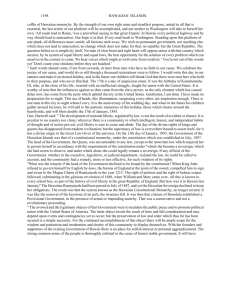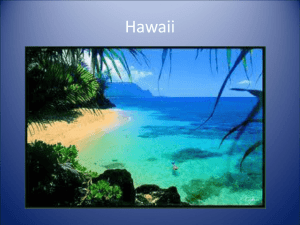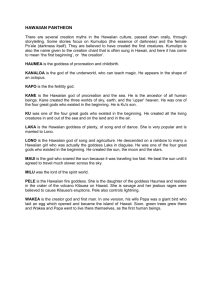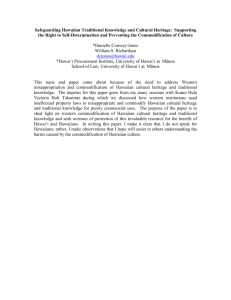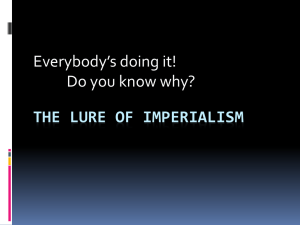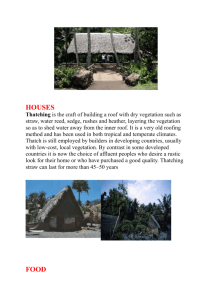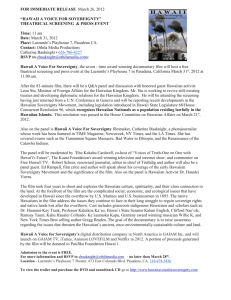Hawaiian Culture and the Workplace
advertisement
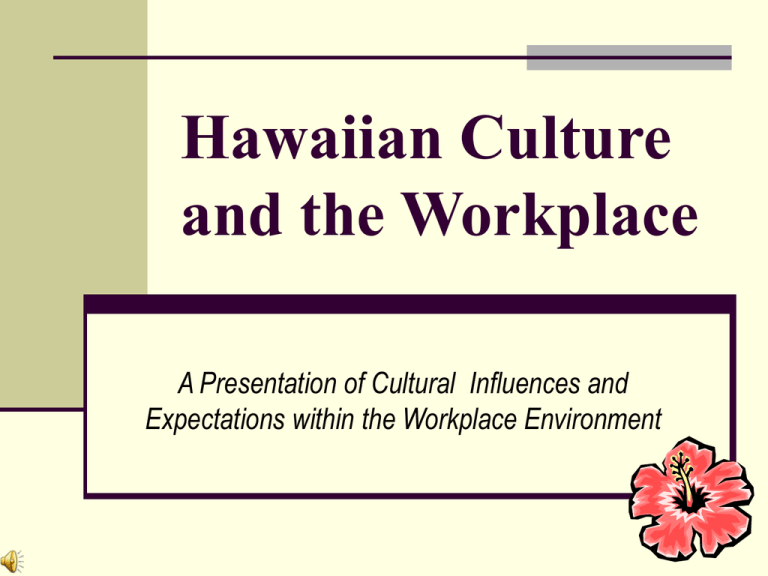
Hawaiian Culture and the Workplace A Presentation of Cultural Influences and Expectations within the Workplace Environment Hawaiian Culture and the Workplace Hawaii is uniquely known throughout the world for the hospitality of its people and the famous “aloha spirit”. Although these are positive perceptions, there are a few unflattering negative perceptions and prejudices of Hawaiians in the workplace which stem from a misunderstanding of their very rich cultural background. A few of these cultural aspects will be covered in this presentation including the following: Hawaiian Culture’s Most Well Known Contribution The Hawaiian Perception of Time The Unique Concept of the Family or “Ohana” The Hawaiian Island’s Unique Pidgin Language Hawaiian Cultural Contribution The Hawaiian Culture’s Greatest and Most Well Known Contribution to the World is the “Aloha Spirit” “Hawaiians, in general, to their eternal credit, are still known as a people of a loving and generous nature. Hawaiian culture has left an important, humanizing legacy for the world” - Surfing for Life (2001) Resource: Surfing for Life (2001). Life in Harmony with Nature– Cooperation Not Competition With All That Surrounds Us: Hawaiian Culture as Represented in Surfing for Life. Retrieved February 16, 2008 from http://www.surfingforlife.com/culture.html The Spirit of Love and “Aloha” The Hawaiian Culture’s Greatest and Most Well Known Contribution to the World is the “Aloha Spirit” Herb Kane, artist, writer and co-founder of the Polynesian Voyaging Society, defines aloha the following way: “An unquestioning friendship and desire to share, developed within the 'ohana but extended to all persons of good will, aloha has been variously defined as affection, compassion, mercy, sympathy, civility, kindness and charity. It is given without restraint or ulterior motive, and it is expressed with a geniality which springs from one who is secure in his society and his environment.” The “aloha spirit” is a friendliness, a caring, a willingness to be helpful, most often expressed as the hospitality (Ho'okipa) …. - Surfing for Life (2001) Resource: Surfing for Life (2001). Life in Harmony with Nature– Cooperation Not Competition With All That Surrounds Us: Hawaiian Culture as Represented in Surfing for Life. Retrieved February 16, 2008 from http://www.surfingforlife.com/culture.html The Spirit of Love and “Aloha” Did You Know the Aloha Spirit is the Law in Hawaii? “Well, not exactly, but the definition of aloha spirit and guidance for public officials to remember this philosophy when performing their duties is contained in the Hawaii Revised Statutes (State Law): [§5-7.5] Aloha Spirit … “ "Breaking this law carries no obvious penalty such as a fine or being put in jail. Forgetting it does have consequences, the least of which is that things just won't work as well as they do when we remember it! It is similar to the Golden Rule, though not exactly the same in usage. Like the Golden Rule, though, Aloha Spirit can change the world.” - OhanaNet Corp. (2001) Resource: OhanaNet Corporation (2001). What Time is it? Hawaii School Reports. Retrieved February 16, 2008 from http://www.hawaiischoolreports.com/symbols/time.htm The Spirit of Love and “Aloha” Did You Know the Aloha Spirit is the Law in Hawaii? Hawaii Revised Statutes (State Law): [§5-7.5] "Aloha Spirit". "Aloha Spirit" is the coordination of mind and heart within each person. It brings each person to the self. Each person must think and emote good feelings to others. In the contemplation and presence of the life force, "Aloha", the following unuhi laula loa may be used: "Akahai", meaning kindness, to be expressed with tenderness; "Lokahi", meaning unity, to be expressed with harmony; "Oluolu", meaning agreeable, to be expressed with pleasantness; "Haahaa", meaning humility, to be expressed with modesty; "Ahonui", meaning patience, to be expressed with perseverance. Resource: OhanaNet Corporation (2001). What Time is it? Hawaii School Reports. Retrieved February 16, 2008 from http://www.hawaiischoolreports.com/symbols/time.htm The Spirit of Love and “Aloha” Benefits of the “Aloha Spirit” “When Woody Brown arrived in Hawai'i in 1940…he was recovering from the devastating death of his wife during childbirth. As he traveled throughout the islands, he experienced overwhelming warmth, generosity and hospitality from the native Hawaiian people he met. This is the famous aloha spirit that the world has come to identify with Hawai'i, and it was Woody's salvation.” - Surfing for Life (2001) Resource: Surfing for Life (2001). Life in Harmony with Nature– Cooperation Not Competition With All That Surrounds Us: Hawaiian Culture as Represented in Surfing for Life. Retrieved February 16, 2008 from http://www.surfingforlife.com/culture.html Concept of Hawaiian Time Hawaiian Time “The phrase ‘Hawaiian Time’ refers to the laid back pace that one finds in the islands. For newcomers, it can seem like it takes longer for things to get done, and this may be true. Longer term residents know it has more to do with allowing time for all that is important, . . .” - OhanaNet Corp. (2001) Resource: OhanaNet Corporation (2001). What Time is it? Hawaii School Reports. Retrieved February 16, 2008 from http://www.hawaiischoolreports.com/symbols/time.htm Concept of Hawaiian Time Hawaiian Time “Local people or long time residents live by it, valuing relationships more than money. These are people who think the best thing they did all day was stop and ‘talk story’ with an old friend from grade school. You'll see lots of bumper stickers on Maui that say ‘Slow Down – This Ain't The Mainland’.” - Kean Salzer (2008) Resource: Kean Salzer (2008). Hawaiian Time. Maui.net: All Things Maui. Retrieved February 16, 2008 from http://www.maui.net/trip-planning/best-of-maui/26/hawaiian-time.php Concept of Hawaiian Time Time is not clock-oriented Deadlines have little meaning Tasks are without urgency or time constraints Punctuality is not a priority Live for the present and not the future Planning for the future is not a priority Concept of Hawaiian Time Time is not clock-oriented “In contrast to the Western clock-oriented value [system], some cultures are not conditioned to use every moment in a productive, task-oriented manner.” - Zhang (2001) Resource: Zhang Jian X (2001). Cultural diversity in instructional design. International Journal of Instructional Media, 28(3), 299. Retrieved December 18, 2007, from Research Library database. (Document ID: 79122062). Concept of Hawaiian Time The “Good” of Hawaiian Time The Hawaiian concept of time may be perceived as apathetic, lazy, and unmotivated. In reality Hawaiian culture values time, cherishes time, enjoys and even relishes time . To Hawaiians, time is not meant to be used for a flood of activity, always attempting to cram as much as possible into each waking moment. Time is considered a gift to allow people to do things important and meaningful in life. Time allows people to enjoy life, to contemplate, to allow an opportunity to provide meaning to one’s existence. Concept of Hawaiian Time The “Good” of Hawaiian Time “Nothing is more incorrect than the stereotype of the ‘lazy’ Hawaiian; they are an industrious and willing people, but their commitments are always more firm and productive if the goal is an intensification of human relationships rather than an accumulation of personal wealth or some individual achievement.” (Gallimore & Howard, 1968, p. 10) Resource: Ronald Gallimore (1981). Notes from: "Affiliation, Social Context, Industriousness, and Achievement", edited by Ruth H. Munroe, Robert L. Munroe, Beatrice B. Whiting, Garland STPM Press, New York & London, 1981. Retrieved February 17, 2008 from http://www.noteaccess.com/APPROACHES/ArtEd/History/SocAffilAchievmnt.htm Concept of Hawaiian Time Interesting Fact About the Hawaiian Time Zone “Hawaii Standard Time (HST) does not adjust for Daylight Savings, keeping the same time yearround. This means that the islands are three hours behind the west coast of the U.S. in summer, two hours in winter, and are six hours behind the east coast in summer, five hours in winter.” - OhanaNet Corp (2001) Resource: OhanaNet Corporation (2001). What Time is it? Hawaii School Reports. Retrieved February 16, 2008 from http://www.hawaiischoolreports.com/symbols/time.htm Meaning of Family or “Ohana” The “Ohana” “Ancient Hawaiian children grew up in a warm and affectionate world where people not related by blood were considered part of the 'ohana, or extended family. To Hawaiians, the family consisted not only of the usual blood relatives, but also those who were loved or who chose to participate in cooperative actions….Hawaiians and Polynesians were very much aware of themselves as a member of the larger 'ohana.” - Surfing for Life (2001) Resource: Surfing for Life (2001). Life in Harmony with Nature– Cooperation Not Competition With All That Surrounds Us: Hawaiian Culture as Represented in Surfing for Life. Retrieved February 16, 2008 from http://www.surfingforlife.com/culture.html Meaning of Family or “Ohana” The “Ohana” “In Hawaii, …Many families consist of parents, grandparents and children all residing under one roof. It's not unusual to see a child being raised by a grandparent or aunt while the parents live and work elsewhere. The Hawaiian family or 'ohana can also consist of others not related by birth. A valued friend can be a member of your 'ohana. An entire group of close friends or associates can be their own 'ohana.” - Ken Conklin (2006) Resource: Ken Conklin (March 2006). The word 'OHANA is a modern invention. Retrieved February 16, 2008 from http://www.angelfire.com/hi2/hawaiiansovereignty/ohana.html. Meaning of Family or “Ohana” Importance of “Ohana” Hawaiians work better in a cooperative team than as individuals. Hawaiians like to share and depend on each other's contributions. Hawaiians are reluctant to compete with peers or excel at the expense of others. The family, community, and group take precedence over the individual. Obligations to family, friends, and extended family are of utmost value. (see next slide “Sick for a Day”) Meaning of Family or “Ohana” “Sick for a Day” “Anona Napolean's family has a tradition they call ‘Napoleon's Holiday,’ a tradition in which she and her husband would call in sick for work and then call their children's school to report them sick as well. They would pack up a picnic lunch and load the children and the surfboards into the car and head to the beach for a day of surfing and family enjoyment. She and her family felt it is important, on occasion, to just let go of work or whatever you're doing and come together as a family.” - Surfing for Life (2001) Resource: Surfing for Life (2001). Life in Harmony with Nature– Cooperation Not Competition With All That Surrounds Us: Hawaiian Culture as Represented in Surfing for Life. Retrieved February 16, 2008 from http://www.surfingforlife.com/culture.html Meaning of Family or “Ohana” The Benefits of the “Ohana” As Lilo so eloquently stated in the Walt Disney animated film Lilo and Stitch, “'Ohana means family. Family means no one is left behind - or forgotten.“ Resource: Clark Spencer (Producer), & Dean DeBlois and Chris Sanders (Director). (2002) Lilo & Stitch [Motion picture]. United States: Walt Disney Pictures. The Hawaiian Pidgin Language The Origin of the Hawaiian Pidgin Language “Pidgin is a beautiful, expressive language. It was originally created so that the immigrants, the Japanese, Chinese, Portuguese and Filipinos as well as the Hawaiians and the Americans could do business. What evolved is a true language. Almost all people who live [in Hawaii] weave some pidgin into their daily conversation, education and upbringing notwithstanding.” - Eye of Hawaii (2008) Resource: Eye of Hawaii (2008). Pidgin The Unofficial Language. Retrieved February 16, 2008 from http://www.angelfire.com/hi2/hawaiiansovereignty/ohana.html. The Hawaiian Pidgin Language A Few Common Pidgin Words You Will Hear Spoken by Hawaiians. (Eye of Hawaii: Pidgin The Unofficial Language, 2008) any kine (enee kyne) . Anything. No listen to dat tita, she say any kine, brah. boddah you? Are you disturbed by this? Darlene wen go foa da beach wid me. Wot? Boddah you? brah. Brother. Eh, brah, get one nuddah beer? choke. A vast amount. Ho, get choke mangoes dis yeah, brah! foa. For, used in place of "to". Easy foa say, hahd foa do. grind. To eat. So what you like grind? We no moa da kine. No worries, brah, I grind any kine. howzit? How are you? Eh, howzit, brah. You get any da kine? kay den. All right. Kay den, I no show you mine. no moa. Completely out of, no more, none. Chee, we get no moa da kine. Bummahs. ono (OH-no). Actual Hawaiian word, meaning delicious. In pidgin can also mean several other things. Ho, Junior, look at dat Charlene. She so ono, yeah? pau (pow). Actual Hawaiian word, used constantly, meaning finished or done. Chee, I thought you pau already! Resource: Eye of Hawaii (2008). Pidgin The Unofficial Language. Retrieved February 16, 2008 from http://www.angelfire.com/hi2/hawaiiansovereignty/ohana.html. The Hawaiian Pidgin Language What if I don’t understand what they just said? Most Hawaiians can speak and switch between both pidgin and standard English. Sometimes pidgin words will unwittingly be interspersed within the context of a Hawaiian’s standard English speech because it is so common and natural to them. If this happens and you don’t understand what a Hawaiian just said, ask for clarification and they are more than happy to accommodate you. The Hawaiian Pidgin Language Pidgin Sentence: Howzit brah! Now dat we pau work we go look somplace foa grind! ????? ????? English Translation: How are you! Now that we are finished with our work, let’s find a place to eat! Sounds like a great idea! The Hawaiian Pidgin Language Pidgin Sentence: Eh, brah. You get any da kine, pen? Mine get no moa ink! ????? ????? English Translation: Hello! Do you have an extra pen? Mine ran out of ink! Here, you can borrow mine! The Hawaiian Pidgin Language Pidgin is a Language “Pidgin is a language, just as English is a language. Language is the carrier of culture, and Pidgin is the carrier of ‘local’ culture. It is part of what makes Hawai`i different from the rest of the U.S. Denigration of Pidgin is denigration of its speakers, a majority of the population of Hawai`i. Pidgin is inclusive, a reflection of our historical attitudes and the value placed on getting along and trying to find common ground. It is non-hierarchical, and puts people on an even footing.” - Da Pidgin Coup (November 1999) Da Pidgin Coup (November 1999) Pidgin and Education. a position paper by Da Pidgin Coup of the University of Hawai`i Retrieved February 16, 2008 from http://www.hawaii.edu/sls/pidgin.html. Hawaiian Culture and the Workplace Culturally Sensitive “Being culturally sensitive means being able to view the world from the standpoint of a culture other than one's own.… this means accepting as valid the culturally different learners' values, their motives, rewards that are meaningful to them, their locus of control, their linguistic systems, their learning styles, and their cognitive styles.” - Zhang (2001) Resource: Zhang Jian X (2001). Cultural diversity in instructional design. International Journal of Instructional Media, 28(3), 299. Retrieved December 18, 2007, from Research Library database. (Document ID: 79122062). Hawaiian Culture and the Workplace Presentation References: Ken Conklin (March 2006). The word 'OHANA is a modern invention. Retrieved February 16, 2008 from http://www.angelfire.com/hi2/hawaiiansovereignty/ohana.html. Kean Salzer (2008). Hawaiian Time. Maui.net: All Things Maui. Retrieved February 16, 2008 from http://www.maui.net/trip-planning/best-of-maui/26/hawaiian-time.php OhanaNet Corporation (2001). What Time is it? Hawaii School Reports. Retrieved February 16, 2008 from http://www.hawaiischoolreports.com/symbols/time.htm Surfing for Life (2001). Life in Harmony with Nature– Cooperation Not Competition With All That Surrounds Us: Hawaiian Culture as Represented in Surfing for Life. Retrieved February 16, 2008 from http://www.surfingforlife.com/culture.html Clark Spencer (Producer), & Dean DeBlois and Chris Sanders (Director). (2002) Lilo & Stitch [Motion picture]. United States: Walt Disney Pictures. Zhang Jian X (2001). Cultural diversity in instructional design. International Journal of Instructional Media, 28(3), 299. Retrieved December 18, 2007, from Research Library database. (Document ID: 79122062). Ronald Gallimore (1981). Notes from: "Affiliation, Social Context, Industriousness, and Achievement", edited by Ruth H. Munroe, Robert L. Munroe, Beatrice B. Whiting, Garland STPM Press, New York & London, 1981. Retrieved February 17, 2008 from http://www.noteaccess.com/APPROACHES/ArtEd/History/SocAffilAchievmnt.htm Eye of Hawaii (2008). Pidgin The Unofficial Language. Retrieved February 16, 2008 from http://www.angelfire.com/hi2/hawaiiansovereignty/ohana.html. Da Pidgin Coup (November 1999) Pidgin and Education. a position paper by Da Pidgin Coup of the University of Hawai`i Retrieved February 16, 2008 from http://www.hawaii.edu/sls/pidgin.html.
